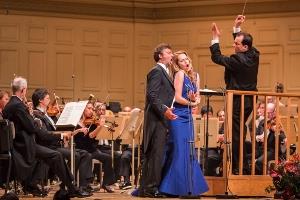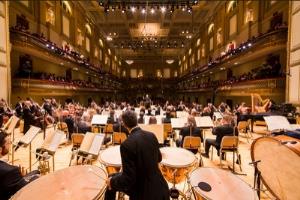Though many a symphony season ticket holder might protest the following as unsophisticated and lazy, a great place to watch and appreciate a classical concert is in front of a good TV set during an expertly directed production.
A viewer trades off the excitement of being there for perspectives even occupants of the best seats are denied: Shots of orchestra members -- their strings, woodwinds, brass or percussion skills viewed so close-up, it's like sitting next to them; the front view of the conductor, whose facial expressions and body language are stage directions to those facing the podium; and (depending on the quality level of the equipment on which it's watched), sound that isn't badly affected by a hall's acoustics or an attendee's seat placement.
Those advantages should be clear to viewers of the upcoming Great Performances special, “Boston Symphony Orchestra: Andris Nelsons' Inaugural Concert” (9 p.m., May 29 on PBS -- check local listings). A few select mysteries aside, it is an enjoyable two hours of great music, well-performed and excellently presented.
Of course, for those of us who aren't serious musicians, an even better advantage of watching at home would be to share the viewing with someone who carries many credentials as a classical musician. Whispering between audience members is poor form at a concert. But at home, where the expert is in the same room and the pause function allows forgivable interruption of the performance, it's like an E-Ticket guided tour.
The person with whom such a viewing was shared recently has been part of major orchestras and classical ensembles for most of her adult life. She has performed in many parts of the world and also has had a long-term leadership position with a prestigious teaching institution. Retired now (and perpetually unpretentious, one suspects), she feels no need to be in a spotlight and requested she not be identified as a condition of sharing some of her insights and explanations. Since nothing she said is negative and because it is so interesting to hear her insights, we have no problem with her simple request.

First, though, a little mystery and an explanation: When a new musical director is hired to lead one of the country's premier orchestras, it would seem the debut performance would want to show off the orchestra. But getting a lot of stage time during this concert are two vocalists, soprano Kristine Opolais (aka Mrs. Nelsons) and tenor Jonas Kaufmann (right with Opolais). And opera is the main ingredient in the night's entertainment. In addition to solos and duets performed by the vocalists, two of the three purely orchestral pieces are from operas.
Our guest explained that the BSO's search committee undoubtedly knew of Nelsons' love of opera before hiring him, and the intro was an opportunity to "showcase the hallmark" of his interests from the start. "It was a good call for the orchestra," she added. The audience enthusiastically agreed.
Another uniquely Boston aspect of the event is the venue. Our guest explained Symphony Hall is so acoustically pure that orchestral pieces that begin quietly can begin as written when performed there. In some halls, she explained, the quiet beginnings either are lost to some in the audience or the conductor realigns the score upward from soft to compensate for the limitations. She also pointed out that the two Wagner vocal selections were written specifically for the Wagner-designed hall in Bayreuth, Germany, in which the orchestra is located under the stage -- an arrangement that notably amends its sound dynamics:
"Anywhere other than in (Wagner's) theater, Wagnerian singers have to shout" to overcome an orchestra seated on stage or in a pit. The acoustics in Boston somewhat alleviate that effect.
The evening's finale, Respighi's Pines of Rome, will be familiar to many. But our guest was able to alert us to two unique aspects. First was to point out the fact that the sound of a trumpet solo was from off-stage, as written by the composer. (Later camera shots showed musicians in different positions in the auditorium, fulfilling the arms-length directions of the composer.) The other was to the fact that the sound of a bird singing, later in the work, almost certainly has been mechanically produced since "Pines" was written in the early 20th century. Two small details, but ones even the most devoted music lover might not notice during a normal listening.

Other points were just fun to learn. She knew several of the members of the orchestra and shared some of their background. And when Kaufmann was performing a solo, she remarked how it was the first time she had seen him perform without the makeup and costuming worn in operatic productions. Small point, but one many of us might not have the experience to be able to notice.
Our guest wasn't able to guess, however, why the broadcast included interviews with Nelsons, Kaufmann, several members of the orchestra, but not with Opolais. Nor did she care to speculate why the subtitled translations of the sung pieces were in such a small size that often disappeared into a similarly colored background.
She was totally familiar with the pieces and didn't need the subtitles. Any viewer who isn't and would like to better understand what the singers are expressing would be wise to research the pieces ahead of time. Here is the program, in case some preliminary research is a goal:
WAGNER: Overture to Tannhäuser
WAGNER: "In fernem Land" from Lohengrin, Act III – Kaufmann
WAGNER: Prelude and Liebestod from Tristan und Isolde – Opolais
MASCAGNI: “Mamma, quel vino è generoso” from Cavalleria rusticana, Act II – Kaufmann
PUCCINI: Un bel di from Madama Butterfly – Opolais
MASCAGNI: Intermezzo from Cavalleria rusticana
PUCCINI: "Tu, tu, amore? Tu?" from Manon Lescaut, Act II – Opalais, Kaufmann
PUCCINI: Act I finale La Boheme (encore) – Opalais, Kaufmann
RESPIGHI: Pines of Rome
We, however, won't share our docent. We'll keep that treasure to ourselves.